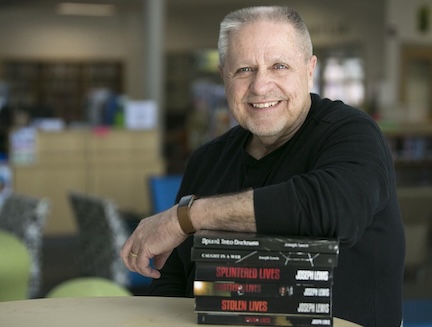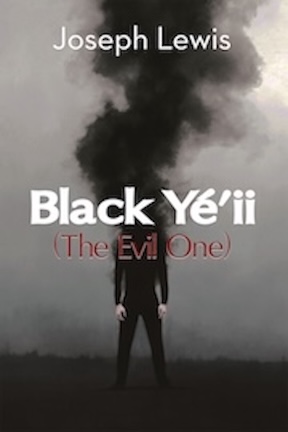On occasion, I run a 6Ws feature to give fellow authors and their books a bit of promotion. Joseph Lewis is the next. (With a nod to my former life as a journalist, I opted for the 6Ws of the business: who, what, when, where, why and how, which counts as it ends in W.) I have read every book he has written, finding myself intrigued by the characters and settings he creates for his stories. I will let him tell you about his writing, including his latest, Black Yéʼii (The Evil One).
Who is the author Joseph Lewis?
I grew up poor in a family of ten with one income. But it was a happy home and one I’d never trade. I’ve been married for 33 years and have raised three wonderful children. Unfortunately, my son is deceased, but my two daughters are married, and my wife and I have one grandson and another on the way.
I was always a reader, but honestly, I didn’t consider writing until later in life. I had always wanted to be a singer. I cut a few demo tapes, but they didn’t go anywhere. I sang a song for each of my daughter’s weddings, along with a few nieces and nephews. I even sang at funerals, which was tough to do, especially if I knew the person.
I grew up in Wisconsin but worked in education in Wyoming, Nebraska, California, Wisconsin and Virginia. Kim and I now live in Virginia. I am finally retired after 49 wonderful years in education as a teacher, coach, counselor, and administrator. And Kim and I share our home with two rescue dogs, a Golden Retriever named Daisy and a Beagle mix named Stella.
What is your latest book?
Black Yéʼii (The Evil One) comes from the Navajo Nation. A Yéʼii is a spiritual deity, and in the Navajo culture, there are many. However, there is one they never speak of, and even refrain from saying the name. By doing so, they feel that “the evil one” will come into and take over their lives and cause harm to themselves and others. In my book, Black Yéʼii does, and it causes harm to many — both knowing and unknowing.
I knew from the outset it was going to be about good versus evil, and I had hoped readers would respond to that.
I think several of the reviews captured my book nicely: Cam Torrens wrote, “On one side, unconditional familial love supported by the camaraderie of law enforcement. On the other? Guns, drugs, and hatred. Black Yé’ii stages an epic battle between good and evil.”
Sublime Book Reviews wrote, “Black Yé’ii explores both the darker side of human nature and the positive theme of family and friendship.”
And, Brian Kaufman wrote, “Gang revenge in a small Wisconsin town – a prescription for tense action sequences – elevated by the nuances of a psychological thriller. The novel features two kinds of family – the supportive kind that rests on unconditional love, and the toxic kind that binds gangs, which is a stark contrast and befits a battle between good and evil.”
When did you begin writing?
My interest in writing began in sixth grade and grew from there. During elementary school, I would wait for my father to pick me up on his way home from work. My school was across from the public library, and I would wander the stacks until a book cover and blurb attracted me to a book that looked and sounded interesting. I would sit on the floor between the rows of books and read. Many times, my father would have to hunt for me, but he never complained.
While I was a counselor, I took screenwriting courses and creative writing courses. I wrote my first short story after watching the movie Stand By Me, and it was published in 1987. My first book, Taking Lives, Prequel to the Lives Trilogy, was published when I was 60 in the summer of 2014.
I think I am a living testament to the adage, one is never too old to begin something new.
How do you write?
Hmmm, I had to think about this. I don’t use a formula. I sit down with my laptop and begin typing away. Seems anticlimactic, I suppose, but that is what happens. I begin with a question in mind, and I spend a great deal of time thinking about it.
My “thinking about it” is what I call prewriting in my head. I think that’s just what happens. When I “feel” ready, I sit down and begin.
The blank page doesn’t scare me, and I don’t believe in such a thing as writer’s block. I try to write every day, whether I’m sick or healthy, tired or not.
Some days, the writing flows. Other days, it’s a struggle, but I keep at it. If I don’t like that day’s or the previous day’s work, I cut it out, save it “just in case” and begin again. I can always take a nugget from it.
Where do you write?
I can’t write in seclusion. I need noise — whether it’s the TV or music or Kim talking to me. So, I sit down at my kitchen table and write. I have a nice office on the second floor, and sometimes I’m at a tricky passage or piece of action or thought, even important dialogue, where I will sneak away and hide in it until I’m done. Then, I’m right back at the kitchen table.
My writing time is any part or time of the day, mostly in the morning when I’m fresh. But if I have other chores or things to do, I will write after I’m done.
As I said, I try to write every day. One thing I do, which is important for me to do, is reread the previous day’s writing. That serves two purposes. One, it gives me an opportunity to do early editing in real time, and I can tweak away by changing dialogue, character action and setting. Two, it places me in the “moment” and the setting and thought process of what I want to write that day. To me, the second point is more important because then I make sure there is order and the action of the story is not “chunked” apart. It helps me keep the flow of the story moving.
Why do you write?
Honestly, I have to. The more I write, the more ideas I get. The same is true for reading. There will be something that triggers me, moves me, causes me to question, and I just have to write about it. It truly is that simple. For me, it’s uncomplicated.
Stephen King talks about story ideas in his book, On Writing. He states (and I’m paraphrasing badly) that two or more related or unrelated events take place and they cause him to question it and that question causes an idea.
An example is for my book, Caught in a Web, I was reading the newspaper one day. On the front page was an article about the rise of adolescents experimenting, and dying, from a combination of fentanyl and heroin. Several pages further in was an article on a deadly and ruthless gang, MS-13, and how this gang in encroaching into Northern Virginia and recruiting middle school children. I put the two ideas together.
Then for my most recent book, Black Yéʼii, I expanded on that concept.
At the end of Web, a story was concocted by law enforcement about how four MS-13 gang members died one evening. The “lie” was to protect four individuals who were in that house at the time of the killing, who may or may not have been involved in their deaths. If MS-13 knew the truth, they would be back with revenge in mind to teach a violent and deadly lesson.
For Black Yéʼii, I asked myself a question: What would happen if the secret, the lie, became known? What would happen if someone spoke of what actually happened that night? Two unrelated events created two books — both award winners.
Links to books and social media:
Website: https://www.jrlewisauthor.com
Instagram: https://www.instagram.com/authorjosephlewis/
TikTok: @josephlewis5566
Substack: https://tinyurl.com/2m5ckdvh

